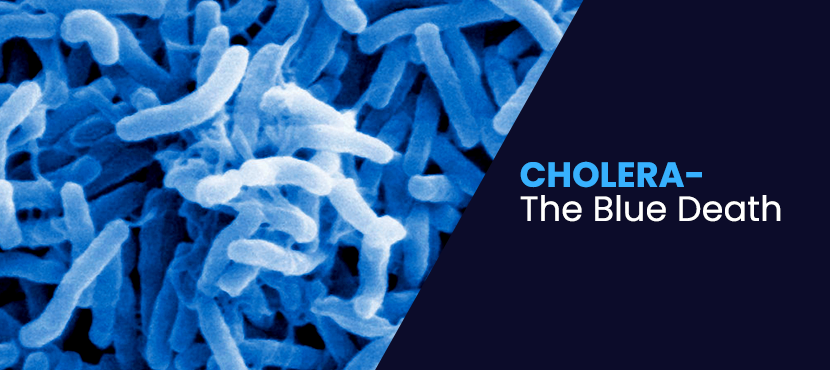Cholera- The Blue Death
What is cholera?
Cholera is a bacterial infection that leads to severe watery diarrhea leading to dehydration. If left untreated, it could even lead to death leaving the body with a bluish-grey tinge due to severe dehydration giving rise to the name ‘Blue Death’. Cholera is caused by a bacterium called Vibrio cholera that is found in food and water contaminated by feces of an infected person. Cholera transmission happens especially during the summer season, famine, crowding, war and so on. It easily spreads in places with poor sanitation facilities and. In the past few days, there has been a rise in cholera cases in Bangalore. Read on to know more about cholera causes in detail and the ways to prevent cholera.
How is cholera transmitted?
As we have already discussed, cholera is caused by the Vibrio cholera bacterium that is usually found in:
- Municipal water supplies and ice made from that water
- Foods and drinks sold by street vendors
- Vegetables that are grown using the water contaminated by human wastes
- Raw or undercooked fish and other seafood from water polluted with sewage
On consumption of water and food contaminated with Vibrio cholera, the bacterium produces a toxin in the patient’s intestines that sets off severe diarrhea. The bacteria has an extremely short incubation period of just between a few hours to five days. In other words, that is the time between which the symptoms of cholera set in.
What are the symptoms of cholera?
- Diarrhea: Cholera-induced diarrhea comes on suddenly and quickly causes dangerous levels of fluid loss in the body.
- Nausea and vomiting
- Dehydration
- In addition, irritability, fatigue, sunken eyes, dry mouth, extreme thirst, dry and shriveled skin, little or no urination, low blood pressure and an irregular heartbeat are some of the other signs and symptoms of a cholera infection.
What are some of the serious risks associated with a cholera infection?
- Dehydration causes a rapid loss of minerals in the blood that leads to electrolyte imbalance.
- An electrolyte imbalance results from the rapid loss of salts such as sodium, potassium, and chloride that cause muscle cramps.
- Low blood volume causes a drop in blood pressure and the amount of oxygen in the body that may cause severe shock.
- Shock may further lead to kidney failure that causes excess amounts of fluids, electrolytes, and wastes to build up in the body.
- Severe dehydration and acute kidney injury due to cholera may lead to the untimely death of a healthy adult.
What are some of the cholera prevention and control steps?
Following are some of the important cholera prevention steps you can follow and safeguard yourself even when you are in a place prone to cholera:
- Drink and use safe water. Use only water that has been boiled, chemically disinfected or bottled for drinking and cooking.
- Wash your hands often with soap and safe water or use sanitizers, especially:
- before you eat, prepare or feed food
- After using restrooms or handling diapers and/or poop
- After taking care of a patient down with diarrhea
- Use proper toilet facilities and sanitation measures.
- Cook food well, especially non-veg and particularly seafood.
- Eat hot and fresh food, keep it covered and peel fruits and vegetables before consumption.
- Clean your kitchen and toilets properly and thoroughly.
- Keep water sources clean and safe from contamination.
- In case you are visiting a place that is prone to cholera, consult your doctor for a dose of WHO-approved vaccine.
What is the tertiary prevention of cholera?
Tertiary prevention of cholera focuses on the people who are already affected by the disease. The aim is to limit or delay the complications resulting due to cholera by treating the disease and providing rehabilitation. Following are some of the steps followed for the tertiary prevention of cholera:
- Rehydration: Aims to replace the lost fluids and electrolytes with the use of a simple oral rehydration solution (ORS) that is available as a powder and can be made with boiled or bottled water.
- Intravenous fluids: Helps in case of severely dehydrated people.
- Antibiotics: They can help reduce the length and severity of cholera-induced diarrhea.
- Zinc supplements: Research shows the possibility of zinc helping decrease and shorten diarrhea, especially in kids down with cholera.
Be alert to the symptoms of cholera and if anyone is suffering from the sudden onset of severe loose stools at least 10 to 15 times in a day, immediately consult a doctor.





No Comments